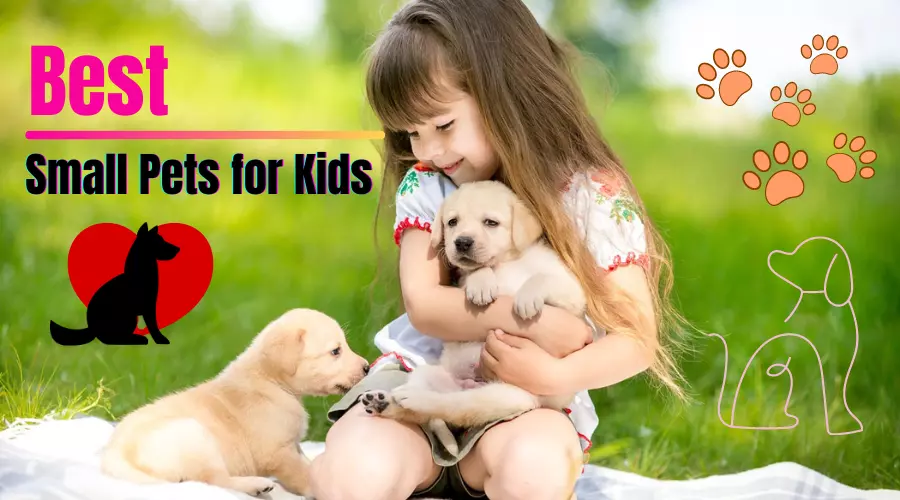
12 Best Small Pets for Kids that They will Love
Small pets for kids can provide a lot of fun and companionship. Small pets are an excellent choice for kids for several reasons. Firstly, they are typically low maintenance and require less space and attention than larger pets. It can be ideal for busy families or living in smaller homes.
Additionally, small pets can give children a sense of responsibility and companionship, as they can care for and bond with their pets.
Small pets for kids are also generally less intimidating than larger animals, making them a good option for children who may be scared of larger pets.
Finally, many small pets have a shorter lifespan, which can help teach children about the cycle of life and death in a gentle and manageable way.
Factors to Consider When Choosing a Small Pets for Kids

Several factors should be considered when choosing small pets for Kids. Here are some essential factors to consider:
Space and Housing Requirements: Different small pets have different space requirements, so it is essential to consider the size of the animal and the amount of space it needs to live comfortably.
You will also need to ensure that the animal's housing is appropriate for its needs and is kept clean and hygienic.
Feeding and Nutrition: The nutritional needs of small pets can vary greatly, so it is essential to research what your chosen pet needs regarding food and supplements.
You will also need to consider the cost of feeding your pet and how easy it is to obtain the necessary supplies.
Temperament and Behavior: Some small pets are more social and outgoing than others, so it is essential to consider your child's personality and what pet would be the best match.
It would help if you also researched the temperament and behavior of different small pets for kids to ensure they are a good fit for your family.

Level of Care Required: Some small pets require more care and attention than others, so it is essential to consider how much time and effort you and your child can put into caring for the pet.
Lifespan: The lifespan of different small pets for kids can vary greatly, so it is essential to consider how long you are willing to commit to caring for your pet and what your family's long-term plans are.
Considering these factors, you can choose the best small pets for kids and family, ensuring that both the pet and your child will be happy and healthy.
Popular Top 5 Low Maintenance Small Pets for Beginners

Low-maintenance small pets can be an excellent option for busy families who don't have much extra time to devote to pet care. Here are seven of the best low-maintenance small pets for kids:
Fish - Betta fish and goldfish are great options for low-maintenance pets. They require minimal feeding and cleaning, making them perfect for families with busy schedules.
Hermit Crabs - Hermit crabs are exciting and unique pets that are easy to care for. They require a small amount of food and water daily, and their habitat must only be cleaned every few weeks.
Guinea Pigs - Guinea pigs are social animals that are easy to care for. They require a cage with food and water and a few toys. They also need their bedding changed regularly.

Hamsters are low- maintenance pets requiring a cage with food and water, a wheel for exercise, and a little attention each day. They are also nocturnal, which means they are active at night.
Rats - Rats are social and intelligent pets that are easy to care for. They require a cage with food, water, little daily attention, and toys.
While these pets may be low maintenance, it's important to remember that they still require care and attention. Always research and ensure you can provide suitable habitats and proper care for any pet before bringing them home.
The Top 5 Best Small Pets for Cuddling

Small pets are soft, affectionate, and perfect for cuddling. Here are the top 5 best small pets for cuddling:
Small Dogs: Small dogs are known for their affectionate nature and love to cuddle up with their owners. They are also very loyal and can make great companions.
Cats: Cats are independent creatures but also enjoy affection from their owners. Many cats love to curl up on laps and be petted, making them excellent pets for cuddling.
Rabbits: Rabbits are gentle and social animals that can make great pets for cuddling. They are soft and furry, and many enjoy being held and petted.
Guinea pigs: Guinea pigs are small, cuddly, and easy to care for, making them a popular pet choice. They are social animals that love to be held and cuddled.
Ferrets: Ferrets are playful and affectionate animals that make great pets for cuddling. They have soft fur and love to snuggle up with their owners.
Remember, while these pets are great for cuddling, it's essential to research and understand their specific needs and care requirements before adopting one as a pet.
Best Small Pet Option For 3, 5, and 8-year-old kids

The best trim pet options for 3, 5, and 8 years old kids would be as follows:
Fish: Fish are low-maintenance pets that can be a good option for kids who may not be ready for the responsibility of a more hands-on pet. Watching fish can be calming and educational for kids, and they can learn about different species and their habitats.
Guinea pigs: Guinea pigs are gentle, social, and relatively easy to care for. They are great for kids who want to interact with their pets as they enjoy being held and cuddled.
Hamsters: Hamsters are active and playful pets that can entertain kids. They are also relatively easy to care for and can teach kids responsibility in feeding and cleaning their pet's cages.
It's important to note that no matter which pets you choose, adult supervision is always necessary when handling and caring for small pets.
Additionally, parents should always research and understand the needs of any pet they plan to bring into their home to ensure they can provide the appropriate care and environment.
Best Small Pet Options for 9, 10, 11, and 12 Years Old Kids

Here are the best trim pet options for 9 to 12-year-old kids would be as follows:
Rabbits: Rabbits are gentle and friendly pets that can make great companions for older children. They are social animals and can be trained to use a litter box. However, they require more space and care than other small pets.
Birds: Birds can be great pets for kids who are a bit older and more responsible. They require more attention and care than other small pets but can be very social and interact with their owners.
Bearded dragons: Bearded dragons are reptiles that can be docile and friendly with humans. They are easy to care for and can be fascinating pets for children interested in reptiles.
Rats: Rats are intelligent and social pets that can form strong bonds with their owners. They are active and playful, making them entertaining to watch, and they can also be trained to do tricks.
Hedgehogs: Hedgehogs are unique and exciting pets that can be entertaining for older kids. They require more attention and care than small pets but can be cute and cuddly.
Adult supervision and research are always necessary when choosing and caring for small pets. Parents should always consider their child's maturity level and ability to care for a pet before bringing it into their home.
Best Small Pets for ADHD Children

There is no definitive answer to the best small pet for an ADHD (Attention Deficit Hyperactivity Disorder) child since every child's situation is unique. However, here are some trim pet options that may be suitable for children with ADHD:
Fish: Fish are low-maintenance pets that can be soothing to watch and help calm children with ADHD. Additionally, caring for fish can teach children responsibility and routine, which can be helpful for children with ADHD.
Guinea pigs are social and friendly pets that can help children with ADHD develop social skills and empathy. They can also be calming and comforting pets to interact with.
Dogs: Dogs can be great pets for children with ADHD as they provide companionship, promote physical activity, and can help teach children responsibility.
However, dogs require much care and attention, so ensuring the child is ready to care for a dog is essential.
It's important to note that no matter which pets you choose, adult supervision is always necessary when handling and caring for small pets.
Overall 12 Best Small Pets for Kids That Love to Own

Many small pets could be great companions for kids between the ages of 3 to 12 years. Here are 12 of the best small pets that kids would love to have:
Guinea pigs: These social animals are known for their gentle temperament and are great for kids who want a furry friend to cuddle with.
Hamsters: These nocturnal creatures are small and easy to care for, making them ideal for younger children.
Rabbits: Rabbits are docile and friendly and come in various breeds and sizes.
Fish: Low maintenance and calming to watch, fish is an excellent option for kids who want a pet they can observe.
Hermit Crabs: Hermit crabs are low-maintenance and interactive, making them an excellent option for kids who want a pet they can play with.
Gerbils: They are social and active, making them an excellent option for kids who want a pet that they can interact with and observe.

Rats: These social animals are intelligent and can be trained to do tricks, making them an excellent option for older kids.
Bearded Dragons: These docile reptiles are easy to handle and a great way to introduce kids to reptiles.
Birds: Parakeets or budgies are great options for kids who want a pet to talk to and interact with.
Hedgehogs: These spiky creatures are low maintenance and unique, making them an excellent option for kids who want a pet that's a bit different.
Chinchillas: These fluffy creatures are active and playful, making them an excellent option for older kids who want a pet they can interact with.
Tarantulas: These arachnids are unique and fascinating, making them an excellent option for kids wanting a creepy and crawly pet.
Advantages & Disadvantages of Owning a Small Pets For Kids
Here are some advantages and disadvantages of each of the 12 small pets for kids listed above:
Guinea Pigs

Advantages: Gentle and affectionate, enjoy socializing with humans and other guinea pigs.
Disadvantages: Require a spacious cage and daily maintenance, which may not be suitable for families with allergies.
Hamsters

Advantages: Low maintenance, easy to care for, and relatively inexpensive.
Disadvantages: Nocturnal animals may not enjoy being handled and may bite if startled.
Fish

Advantages: Low maintenance, Calming to watch & relatively inexpensive to care for.
Disadvantages: Require a clean tank, which may not be suitable for young children who cannot handle feeding responsibilities.
Rabbits

Advantages: Affectionate and playful, bond with their owners, and can be litter-box trained.
Disadvantages: Require daily exercise and a spacious living area, prone to dental issues.
Hermit Crabs

Advantages: Low maintenance, inexpensive, and easy to care for.
Disadvantages: Short lifespan may not be suitable for children who cannot handle delicate animals.
Gerbils

Advantages: Social and active, fun to watch and interact with.
Disadvantages: They can be escaped artists, may bite if startled, and may not enjoy being handled.
Bearded Dragons

Advantages: Docile and easy to handle, they make great pets for reptile enthusiasts.
Disadvantages: Requires a specialized diet and environment, may not be suitable for younger children who cannot handle feeding and care responsibilities.
Birds

Advantages: Affectionate and entertaining, can be trained to mimic sounds and words.
Disadvantages: It may require specialized care, can be messy, and may not be suitable for families with allergies
Rats

Advantages: Intelligent and social, enjoy being handled, and can learn tricks.
Disadvantages: Require daily maintenance, may carry diseases, and have a relatively short lifespan.
Hedgehogs

Advantages - Hedgehogs are low-maintenance pets for people living in apartments or shared spaces due to their quiet nature. They are generally docile and don't require much attention, making them great for people with busy schedules.
Disadvantages - Hedgehogs have specific dietary and environmental needs that can be difficult to manage. They require a specific temperature and humidity level to thrive and can be prone to obesity if not fed a proper diet.
Chinchillas

Advantages - Chinchillas are social and playful animals that can form strong bonds with their owners. They have soft, plush fur requiring minimal grooming and are relatively low-maintenance pets.
Disadvantages - Chinchillas have delicate bones and can be easily injured if improperly handled. They require a specific diet and environment to thrive, including a dust bath to keep their fur clean.
Tarantulas

Advantages - Tarantulas are low-maintenance pets that require minimal space and don't require daily attention. They are also fascinating creatures to observe, making them great for people who enjoy watching and learning about exotic animals.
Disadvantages - Tarantulas can be dangerous and require proper handling and care to avoid bites. They also have specific environmental needs that can be difficult to manage, including a specific temperature and humidity level.
Recap of Having Small Pets for Kids
A small pet can benefit children, including companionship, responsibility, socialization, learning opportunities, stress relief, and physical activity. However, parents must consider their child's maturity level and ability to care for a pet before bringing one home. Additionally, research and understanding the pet's needs are crucial for providing appropriate care and environment.
Checkout Our Latest Articles
- The World's Wealthiest: How Did Elon Musk Get So Billionaire
- 10 Best Mini Microphone For iPhones On Professional
- Craigslist Pets | Free Puppies Near Me
FAQ | Small Pets for Kids
What are Some Low-maintenance Small Pets for Kids?
Ants, Small lizards, Tortoises and turtles, Small birds, chinchillas, and Chipmunks are some low-maintenance small pets for kids.
What Factors Should I Consider When Choosing a Small Pet for My Child?
The Factors Should I Consider When Choosing a Small Pet for My Child are Food, Housing, Socialization, Exercise, Grooming, and Veterinary Care.












